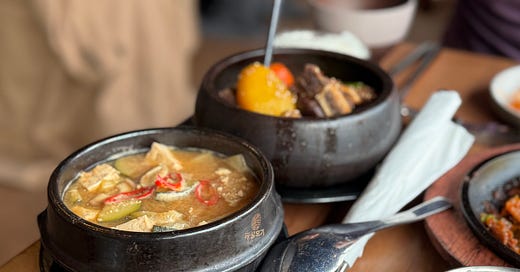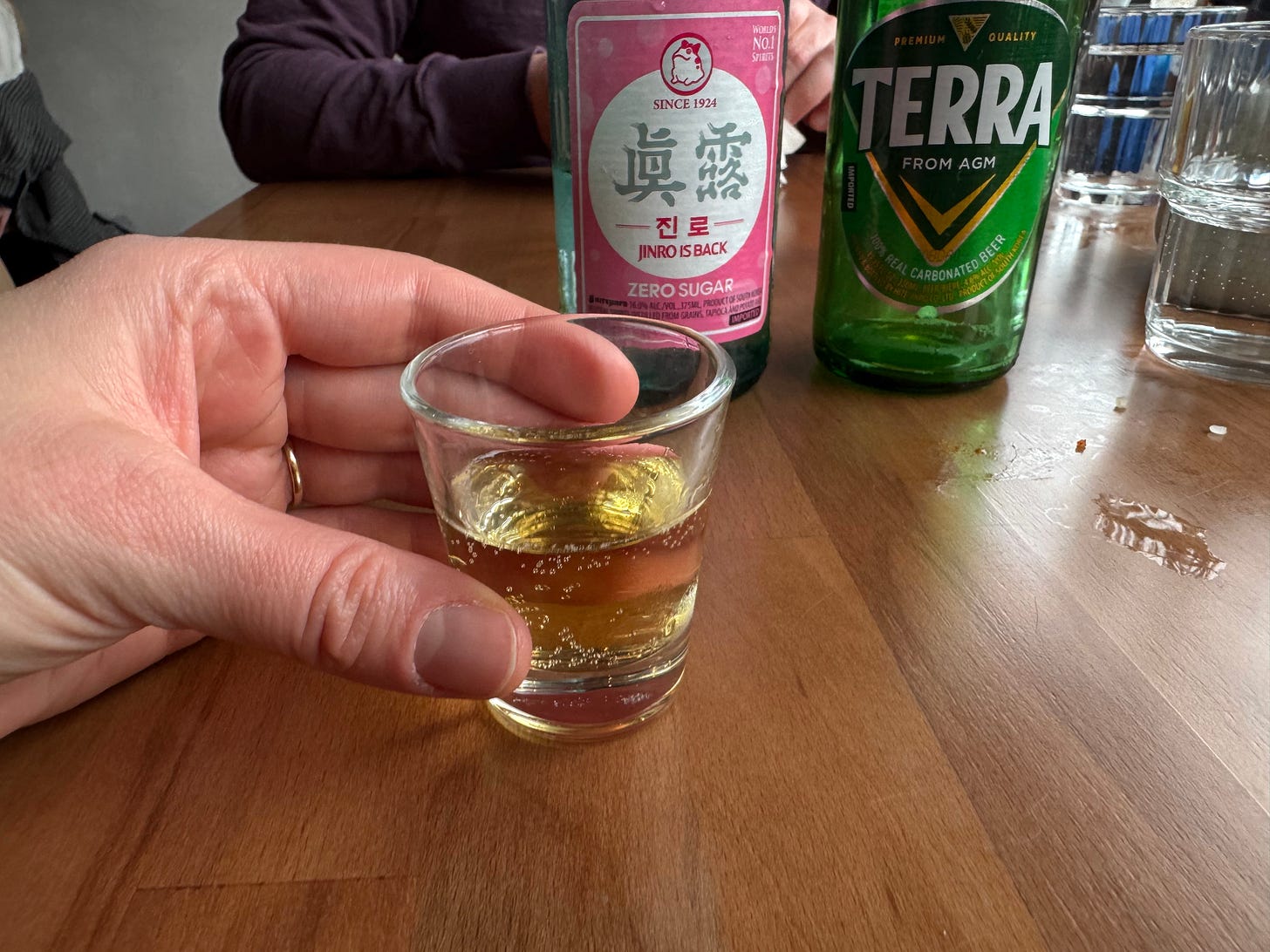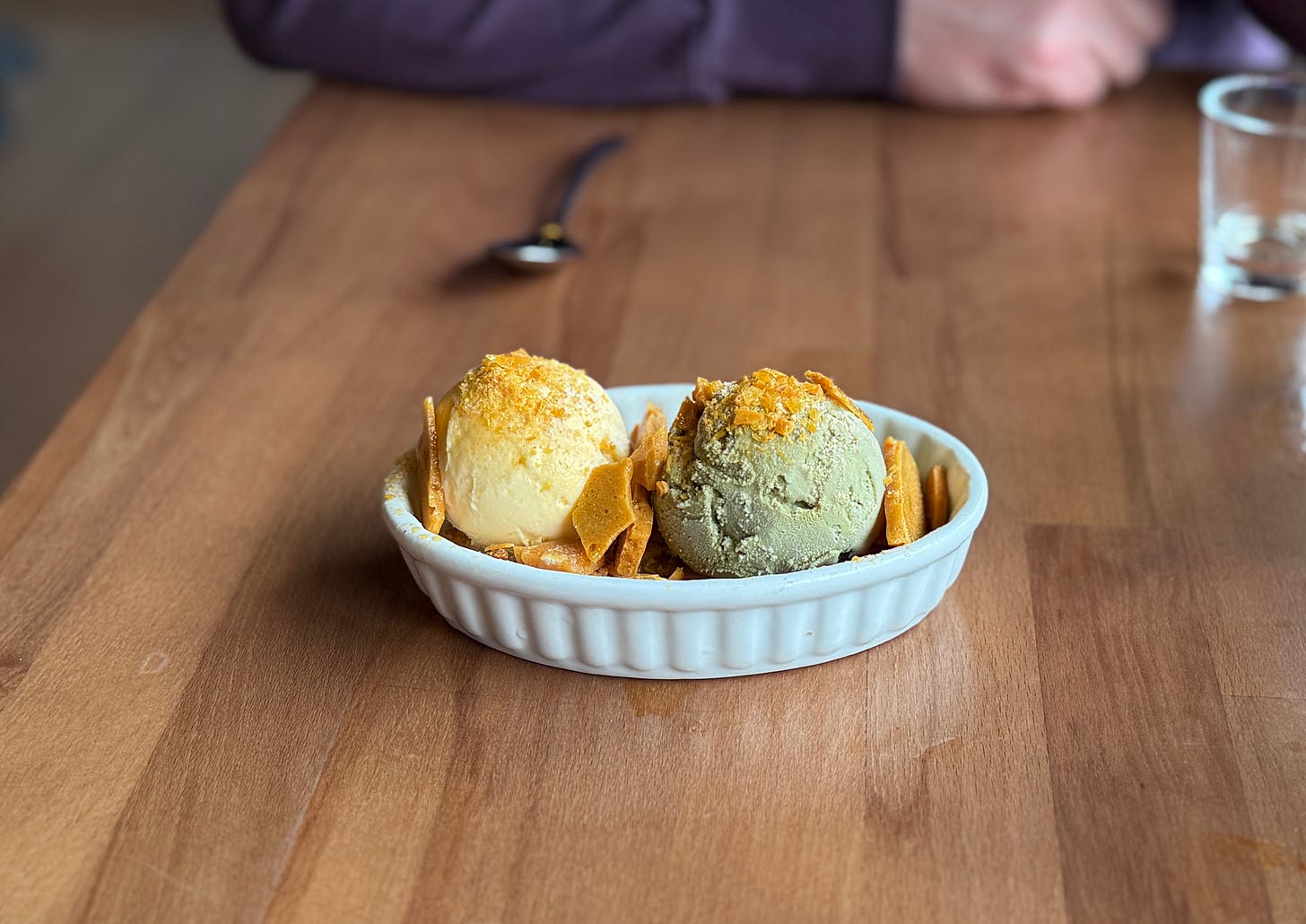Hi, everyone!
It’s Dennis. Though if you look very carefully up top, you’ll notice we have a new contributor today:
.Maggie is a food and drink writer whose work I’ve read for many years now, with bylines in Bon Appétit, Food and Wine, WBEZ, and the New York Times. Up until recently, she was the restaurant critic for Time Out Chicago, but just like many other food writing gigs, her role got snipped due to a shrinking budget. (That ol’ chestnut.)
I asked her if she wanted to write reviews for The Party Cut instead, and to my surprise, Maggie said yes. So she’s joining to pitch in with the same style of unbiased restaurant reviews she was previously writing, and I couldn’t be more excited. Her coverage will be on newer openings in Chicago, while mine will still be the “Oh, I’ve always wondered about that place” sort of thing.
Now, I’ve left the door open for her to come and go as she pleases, and because The Party Cut is a passion-driven project, if Maggie ends up with a better budget elsewhere, I’m 100% telling her to go get a better paycheck. But for now, we have Maggie, and I couldn’t be more excited, because she knows her shit.
Here’s the thing. This little dinghy is glued together with popsicle sticks, so some of her material is going to have to be behind the paywall. I know, I hate it too. But in order to barely cover what Maggie or I would make with a freelance piece at a magazine, I’d have to at least double the amount of people pitching in with subscriptions.
I am by no means guilting you. I’m just being transparent.
It’s just that food and time all just inherently have a price to them, and when I bring other people into the fold, I want to pay them like they’d get paid at a gig elsewhere. I could care less about making money on my side; I’m just grateful I’m not losing any, thanks to you. Because let’s face it, nosing around for good food in a city as incredible as Chicago is an absolute privilege.
So, just think about it, okay? Let’s now welcome Maggie, who’s fittingly writing about Korean food today (this Korean guy wholeheartedly approves). Don’t forget to leave her a bunch of comments saying hi, and sign up to read her Substack newsletter, Little Stories. I know many of you love her work as much as I do.
- Dennis
Son-mat in Korean literally translates to “hand taste.”
It encapsulates the instincts a good cook brings to the kitchen — that miraculous internal jazz of cooking by feel and intuition rather than relying on measurements, and the fingerprint that makes a person’s food taste unlike anyone else’s. I like visualizing son-mat as an actual energy transfer each time a cook massages salt, then shrimp paste and seasonings into every unique batch of kimchi; or gurgling inside the galbi-jjim braise, where short ribs slowly slip off the bone alongside softening root vegetables and bouncy tteok (glutinous rice cakes).
What a gift to be on the receiving end of this magical exchange, as I was on a recent Friday at Mister Tiger, the three-month-old Korean restaurant in West Town that’s easily my favorite opening of the year. Siblings Charlie Park and executive chef Min Lee quietly debuted it in January as an homage to their mother and grandmother, whose son-mat Lee absorbed through years spent helping out in the kitchen, as she told WTTW. (Lee’s husband Brian Lee is Mister Tiger’s third partner.) The results are pure, unabashed homestyle and celebratory Korean cooking of the highest order.
My husband and I booked early dinner a couple weeks in advance. The secret’s all but out here, so reserve a table ahead if you don’t want to wait. It’s a spacious restaurant, unfurling over two rooms with a glossy tile-encrusted bar and minimalist decor — slick looking enough to make you think you’re in for sceney, fusion food.
The meal began as it might in any home, with bottomless snacks presented in the pretty bowls because we’re company. In this case, it comprised four delicious banchan: cabbage kimchi, spicy marinated cucumbers, smooth mashed potato studded with bits of carrot, and my favorite, eggy ribbons of fish cake.
Park developed the cocktail menu, which mixes spirit forward classics (Martini, Old Fashioned, Manhattan, Negroni) and half a dozen signature drinks teeming with sensory memories (all $16).
The cheekily bold Grandma’s Tiger Balm, with bourbon, Fernet, demerara, mint and lemon, is a medicinal Julep that nods to the mentholy salve Park’s grandma used on her joints. The bright and pretty Uprooted, inspired by earthly delights found in Park’s mother’s garden, is as delicately fragrant and pretty as a spring blossom, with gin, amaro nonino, strawberry, tomato, and minty perilla leaf.
The food menu, which confusingly still self-describes as the limited soft-opening version, breaks out across small bites (crispy chive pancakes, Korean fried chicken and dumplings), larger meaty plates (Korean BBQ chicken, beef and pork, galbi-jjim, and short ribs smothered in melted mozzarella), and soul-soothing noodles, rice and stews (bibimbap, kimchi fried rice, japchae, and kimchi and soybean stew).
At the suggestion of our server, we started with pork-filled fried dumplings ($10): crescent-shaped mandu packed bursts of juicy, tender pork and cabbage beneath bubbly, crisp exteriors.
A colorful heap of sweet-spicy cabbage slaw flecked with briny dried seaweed was a crunchy, fresh revelation paired with the dumplings.
I also appreciated the restraint in the still-punchy spicy pork ($26), in which petals of gochujang-kissed meat were stir fried with cabbage and scallion till sweet and charred at the edges.
Rather than fighting for attention beneath a fudgy blanket of sauce, each element, from the pork’s gentle funk to the sting of fermented chili and sweetness of the paste mingling with the softened veg, sang.
Alongside, we shared a South Korean lager ($8) and a bottle of Jinro is Back zero-sugar soju ($18), a crisp and clean, well-distilled rice wine.
“We like mixing the two together, but it’s sort of dangerous,” said our server, as she innocently deposited a pair of shot glasses on the table. Our malty, homemade soju-beer shooters were amiable companions to the bold, meaty food.
A clean soybean stew with a radishy backbone ($15) arrived next, still bubbling madly in its cauldron.
The anchovy-infused broth teemed with restorative shiitakes, zucchini and soft tofu cubes, with raw red chili slivers providing fiery exclamation points.
But even the soup’s evocative tabletop dance was no match for the galbi-jjim ($35), the soy-braised short rib dish that will live rent-free in my brain as a nearly faultless braise.
The beef collapsed at the mere touch of my fork, connective tissue, melting fat and all. It was succulent and savory, a poetic reminder that the tenderest morsels require the most labor and patience. We clumsily fished out tournéed potatoes; wrinkly, mild shishitos; chewy tteok; and carrots carved like gemstones from that sweetly soy-scented, amber braising liquid, feeling like the royalty who feasted on this dish centuries ago.
Much to my tightening waistband’s delight, Mister Tiger only has one dessert: dalgona ice cream, comprising a scoop each of vanilla and green tea ice cream, topped with misugaru (multigrain dust) and toffee-like dalgona crunchies ($8).
I was surprised that I preferred the (more flavorful) vanilla, which complemented the malty misugaru and sugary crunch of the dalgona. This sparked a needlessly scholarly discussion about the word “vanilla” meaning plain when good vanilla is in fact one of life’s great pleasures. Then again, superb meals sometimes make us prone to prattling on like we just walked out of a museum or an arthouse film. That, and maybe soju.
Later, while I waited for the bathroom, I gazed at a pair of toplit photo collages the owners hung in the hallway past a neon tiger in a fedora. They depict achingly nostalgic scenes of the family, whose story stretches from here to New York (where the Parks moved after immigrating) and Korea. Family members cram on patterned couches; kids frown on elders’ laps and squint in the sun with skinned knees. You can’t see it in the photos, but I bet somewhere in the background a vat of kimchi is fermenting, or perhaps a pot of stew is exhaling fragrant steam as it simmers on the stovetop — each waiting to transfer some of its magical energy to the lucky ones who have a seat at the table.
Mister Tiger
1132 W Grand Ave
Chicago, IL 60642
(312) 219-5211
Hours:
Wednesday - Friday: 5:00 p.m. - 9:00 p.m.
Hi, Dennis again, wrapping up. Mister Tiger sounds awesome and based off Maggie’s description, it includes many dishes I grew up with. Today’s edition of The Party Cut’s free, so go ahead and share it on social media to your heart’s content (though Reddit seems to be best for the newsletter):
And I already went over how important the whole subscription thing is. If you can’t tell, I’m trying to make The Party Cut as useful as it can be for you all, but it does take resources. I won’t bug you further, but here’s the button.
Don’t forget to leave a hello to Maggie in the comments section, too, because she’s awesome. I like watching everyone talk to each other anyway. Makes me happy.
I’ll be resuming my usual duties next week for a paid edition of the newsletter, so keep an eye out, okay? Love you guys.












Maggie, welcome to the Dennis Lee publishing empire.
Love seeing the melding of two of Chicago's best food writers in this space. Great first review Marge!